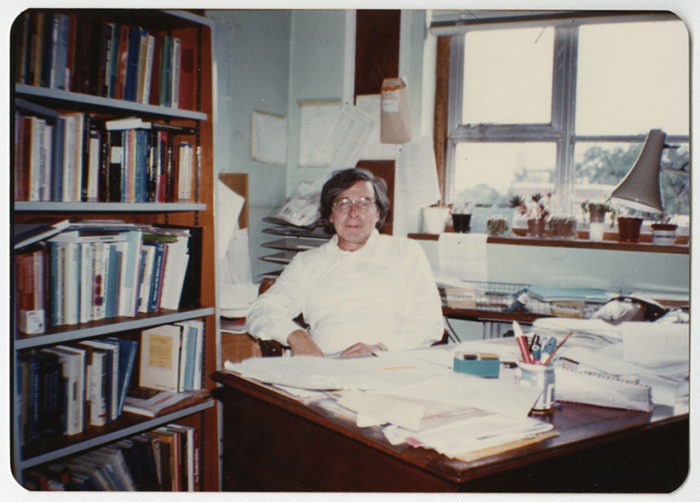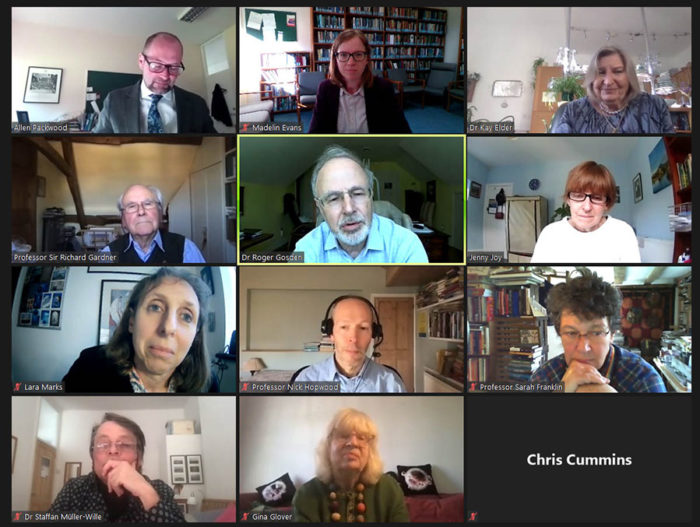On Monday 29th March 2021 the Archives Centre hosted an online symposium on the archive of Professor Sir Robert Edwards, IVF pioneer. The event was part of the inaugural Cambridge Festival, and had originally been planned as a physical event for the Cambridge Science Festival 2020 and postponed because on the Coronavirus pandemic.
The afternoon event focused on ways of working with the archive of Robert Edwards (opened in 2019), and ways of working evidenced in the archive. The symposium took the form of a series of conversations and presentations, and a talk by Jenny Joy (one of Robert Edwards’ daughters).
Session 1: Professor Nick Hopwood (Department of History and Philosophy of Science, University of Cambridge) and Madelin Evans (Edwards Papers Archivist, Churchill Archives Centre) in conversation about using the archive of Robert Edwards for research.
Session 2: Professor Sarah Franklin (Reproductive Sociology Research Group, University of Cambridge) and Gina Glover (Artist, creator of ‘Art in ART: Symbolic Reproduction’ exhibition) on working with images of reproduction in the Edwards archive.
Session 3: Dr Kay Elder (Senior Research Scientist, Bourn Hall Clinic) and Dr Staffan Müller-Wille (University Lecturer, Department of History and Philosophy of Science, University of Cambridge) on using clinical research notebooks, and scientific notebooks and manuscripts, for historical research.
Session 4: Professor Sir Richard Gardner (Emeritus Royal Society Research Professor in the University of Oxford) and Professor Roger Gosden (lately Professor at Cornell University, now Visiting Scholar at William & Mary and official biographer of Robert Edwards) on Robert Edwards’ style of working in the laboratory.
Session 5: Dr Jenny Joy (daughter of Robert Edwards, key in gathering together his archive) on her experience of how her father worked.
See the full programme, including speaker biographies.

Robert Edwards in his office in the Physiology Laboratory, Cambridge, 1979 (EDWS 18/5/17).
Review of the symposium by Diana Smith, Assistant Archivist, Trinity College Library, Cambridge:
“I attended the symposium ‘Ways of Working: The Archive of Professor Sir Bob Edwards (IVF pioneer)’, which was organised by Madelin Evans at Churchill College. The symposium, part of the Cambridge Festival, took place online on 29 March rather than as originally planned a year ago in person at Churchill. I’m an archivist at a college with its own sizeable collection of scientists’ papers, and was drawn to the programme not only to hear a colleague discuss her work with similar papers but also to learn from researchers discussing their use of scientific papers. It was an excellent symposium, with a variety of speakers focusing on the man, his work, and his papers. I came away with some useful information and food for thought as well as a rather good example of an outreach programme organised around a scientist’s papers.
The symposium began with a conversation between Madelin Evans and Nick Hopwood of the Department of History and Philosophy of Science. Madelin’s description of the physical accessioning and processing of the archive was given pleasing precedence in the programme order, and will have been instructive to the students and researchers attending. She touched on some of the challenges of handling an archive containing personal information of women alive today who were involved in the early IVF treatments. She described how some of the material had to be restricted until 2050, and how she balanced the needs of researchers and the privacy of women involved by summarising the restricted research data with general statements that would be useful to researchers and yet maintain the privacy of the women. There were then presentations by researchers and an artist who have used the papers in traditional and non-traditional ways, former colleagues and Edwards’ daughter sharing their memories of the man, the latter bringing it round again to the papers by talking about the piecemeal discovery of papers around the house.
The researcher who appears to have done much to gather Edwards’ research materials at Bourn Hall was Dr Kay Elder, Senior Research Scientist, Bourn Hall Clinic, who described her work in teasing out the information in Edwards’ research notebooks to document in meticulous detail the experiments recorded in them. She was particularly impressive in the question and answer period where her answers to the sometimes overly specific questions from students were thorough and thoughtful. The research of Dr Staffan Müller-Wille, University Lecturer in the Department of History and Philosophy of Science, Cambridge, is a subject close to an archivist’s heart, and so I found his presentation particularly useful and inspiring. His interest is in how scientists stored, retrieved, and used paper research notes before the advent of computers, and pointed to collections with huge miscellaneous stacks of notes with no date or description of what they were, which I found reassuring, as I often wonder whether these papers will be useful or just off-putting to the researcher. Here was someone who was energised by them. His respect for offprints was useful to hear as well, highlighting their use as a means of communication between researchers, and a way of documenting collaboration between researchers in their notes and inscriptions from the author to other researchers. These traditional researchers were balanced by a presentation from artist Gina Glover, who used images from slides of embryos in the collection as a, well, focal point for her art. Her completely visual approach to the collection was a stellar example of the unusual and unexpected ways that archives are used.

In the question period at the end, there was evidence of pressure to release as much information as was possible, including data about the women who took part in the experiments and trials. Madelin revealed that the Centre had received permission to convert the savings from moving the symposium online to fund a project to digitise the clinical research notebooks and letters from women volunteering to take part in the trials that will then be redacted, so that as much information as possible is available without going against GDPR rules. A question was also asked about whether the archivist could contact the women who took part so that they could be interviewed for research purposes, and she explained why this was not possible. There was interest in a media appeal for the women to come forward with the ultimate aim of an oral history programme. It was useful to have Madelin on hand to explain the GDPR considerations and the reasons for closing the collections and to discuss options for navigating the competing responsibilities between privacy and valuable research material.
It was extremely pleasing to see people so engaged with the material. The symposium was recorded and will be linked from the Churchill Archives Centre webpages. I recommend a viewing. Moving a conference online has its downsides in terms of a lack of much personal interaction and cleverly themed reception food, but a real bonus is that the recorded symposium is tailored as much for the audience at the time as for the later viewer. Rather than distant shots of a screen with a PowerPoint presentation punctuated by awkward camera swings over to the speaker at the podium, it is all close up views of shared screens and views of the speaker. I have hopes that these symposium videos will take a respected place as supplements to the tradition of published conference papers.”
For further information see:
Giving life to research: Uncovering the archive of an IVF pioneer, online exhibition by University of Cambridge.
The Archive of Robert Edwards (IVF pioneer), online exhibition by Churchill Archives Centre.
Or email Madelin Evans, archivist, who worked on the Papers of Robert Edwards.
